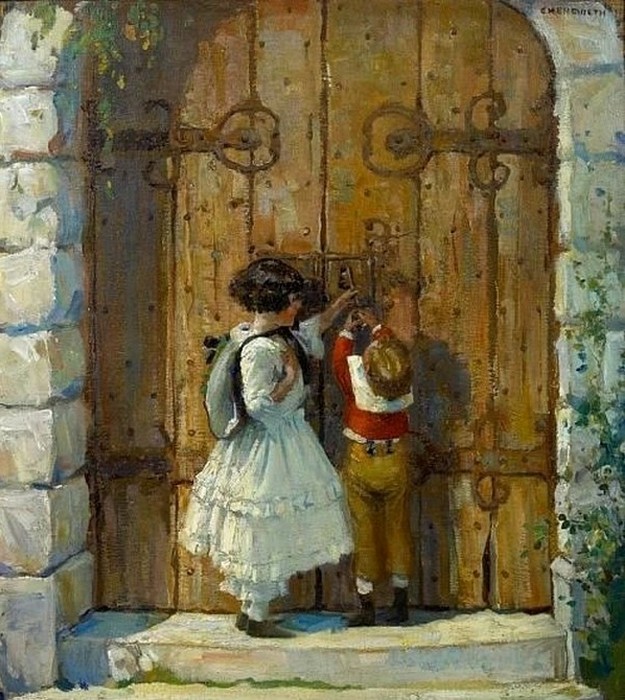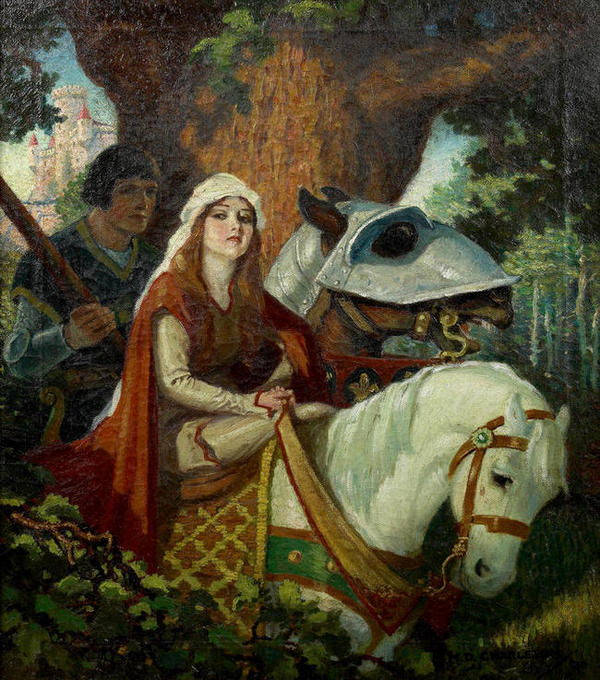Afterwords -- fantasy

"But Jesus called them to him, saying, 'Let the children come to me, and do not hinder them, for to such belongs the kingdom of God. Truly, I say to you, whoever does not receive the kingdom of God like a child shall not enter it.'" (Luke 18:16-17)
“Someday you will be old enough to start reading fairy tales again.” (C. S. Lewis, to his niece)
September 1, 2023
Dear friends,
Some years ago, an older family member passed down to us a complete set of My Book House (Chicago: 1920, 1950), edited by Olive Beaupre Miller. It's a twelve-volume anthology of children's stories, fairy tales, and poems. The artwork in these volumes, especially the front and end papers are by Mareil Wilhoite, Malcolm D. Charleson, and Joseph G. Chenoweth, and beautifully capture the sense of wonder that children have about the world.
I'm not what you would call an avid reader of fantasy, but I do enjoy well-written imaginative literature. For me, I have a special place for the writings of the Inklings (C. S. Lewis; J. R. R. Tolkien, and Charles Williams), and science fiction of the 1950s to 1970s, especially Clifford Simak and Philip K. Dick. I'm soon to embark on a new reading adventure in the stories of George MacDonald at the encouragement of a friend.
IMAGINATION. Children, especially, know how to use their imaginations. There is something timeless about castles and knights, secret gardens and tower doors, elves and dwarves, ships and adventures, and dragons and talking beasts. I suppose some children can get lost in a fantasy world, but considered rightly, such stories give hope and insight into real life. G. K. Chesterton wrote, “Fairy tales do not tell children that dragons exist. Children already know that dragons exist. Fairy tales tell children that dragons can be killed.” There are spiritual principles to be learned, too, as Chesterton observed, “There is the great lesson of 'Beauty and the Beast,' that a thing must be loved before it is lovable.” Fantasy is not reality, but good fantasy can make reality itself to be more real.
THE SENSE OF THE DIVINE. Sometimes the sense of God being present in (or behind, or above) his creation is called "numinousness." When something is numinous it is "supernatural, mysterious; filled with a sense of the presence of divinity, holy; spiritual" (Merriam-Webster). Further, the Bible says we have been given an innate sense of God, who "...has put eternity into man's heart..." (Eccles 3:11; cf Acts 14:17; Rom 1:19-21; 2:15). Calvin wrote about this, calling it the sensus divinitatis:
There is within the human mind, and indeed by natural instinct, an awareness of divinity. This we take to be beyond controversy. To prevent anyone from taking refuge in the pretense of ignorance, God himself has implanted in all men a certain understanding of his divine majesty. Ever renewing its memory, he repeatedly sheds fresh drops." (The Institutes, I:3:1)
THE WONDER OF IT ALL. We see that children are quick to believe what we tell them, and so we think that believing in a world created and ruled by God, and filled with his presence, seems like a childish fairy tale and so we "age out" of such things. And yet, for many the sense does not go away, nor should it. For those of us who have come to faith in God's son, and the revelation of God's mind and will in the Bible, we should relish such an awareness. We should never lose the wonder of it all. We live in a supernatural, God-inhabited world, and we are loved by the great King, who will destroy the evil dragon, and bring us back to the garden, and into a bright, new world, filled with shining beings. We believe some pretty fantas-tical things. But our faith, though childlike, is not childish. The historical evidence of Christ's resurrection from the dead leads us to believe the entire storyline that goes with it, including the King, angels, the dragon, and a secret garden.
THIS THEN IS THE VALUE of imaginative literature, whether it be fairy tales, fantasy, or science fiction -- it's not mere escapism, though it may become that for some. For me, fantasy helps me to get a better grip on reality. Following the characters in the novels of Lewis and Tolkien, for example, gave me deeper insights into biblical characters and truths, and about good and evil. Early in my Christian life, I found that Aslan, the untamed-but-good magical Lion, helped shed new light on my understanding of Jesus, whose lustre the world (and even the church) had managed to make insipid and flat. When I've been reading imaginative literature, and then come back to reality, I'm more fully aware that there is something supernatural (and magical) behind my normal so-called non-fantasy world. Fantasy reminds us that there really is more to reality than time, matter, and chance.
IT'S MAGIC. Some years ago, a favorite prof of mine, John Hannah, was trying to explain how sanctification worked, that is, how could God's holiness and glory be worked into human hearts. "How does that work?" someone had asked. He said, "I don't know; it's magic." Maybe that's not a precise theological explanation, but I certainly know what he meant.
So, we must ask ourselves, how aware are we of God's presence in and above and behind all of creation and history? And how real to us is the wonderful miracle of our salvation?
IN OTHER NEWS.
-- Sean McDowell has just begun a new seminar on Christian apologetics, available (for free) through the Biblical Training website.
-- "Maybe people should stop consulting psychologists about issues of morality... Sometimes shame and guilt are entirely legitimate feelings, earned by terrible decisions that cannot be erased by some mantra about how 'You need to be you' or you should 'be true to yourself.'" (Jonah Goldberg) Read "If Life Was a Movie."
-- "The vision of racialists, whether on the left or right, is pessimistic: the first is driven by a spirit of vengeance, the second by a sense of inferiority. They are two sides of the same coin." (Christofer Rufo) Read "'No' to the Politics of Whiteness."
-- Andy Naselli reviews Rosaria Butterfield’s new book, Five Lies of Our Anti-Christian Age. Read "Don't Believe Culture’s Lies about Men and Women."
FINAL QUOTE.
"I believe in Christianity as I believe that the sun has risen: not only because I see it, but because by it I see everything else." (C. S. Lewis)
And that's it for this week!
Sandy
Image credits: painting above is "Through the Gate" by Joseph G. Chenoweth (1890-1967) for volume 4 of My Book House (Chicago, 1920). The painting below is "From the Tower Window" by Malcolm D. Charleson, cover illustration from volume 10 of My Book House. Unless otherwise indicated, all Scripture quotations are from The ESV Bible (The Holy Bible, English Standard Version), copyright 2001 by Crossway, a publishing ministry of Good News Publishers. Used by permission. All rights reserved.
